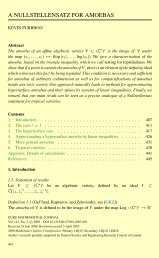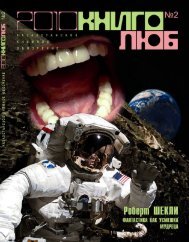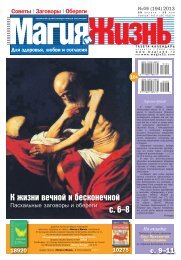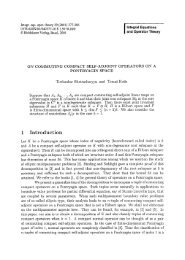computing lives - FTP Directory Listing
computing lives - FTP Directory Listing
computing lives - FTP Directory Listing
Create successful ePaper yourself
Turn your PDF publications into a flip-book with our unique Google optimized e-Paper software.
A<br />
Computer Previous Page | Contents | Zoom in | Zoom out | Front Cover | Search Issue | Next Page M S BE<br />
aG<br />
F<br />
tried to make sense of the report. As the<br />
narrative unfolded, it quickly turned into a<br />
debate over the process of validating scientific<br />
ideas. Many claimed that the scientists who had<br />
performed the original experiments had taken<br />
their ideas too quickly to the public press. Their<br />
supporters argued that traditional laboratories<br />
were too skeptical of new ideas and that the<br />
scientific journals wouldn’t protect the patent<br />
rights of the discoverers. As the excitement of<br />
the moment faded and the realities of the story<br />
became clear, most commentators concluded<br />
that the public had not been well served. “Some<br />
scholars lunge too hastily for glory,” editorialized<br />
Times science writer Nicholas Wade. He<br />
told scientists to never announce their claims<br />
“until your manuscript has at least been<br />
accepted for publication in a reputable journal.”<br />
Nothing has become easier since the<br />
cold fusion controversy or those<br />
first exciting days of X-rays. Science<br />
has expanded. The number of<br />
subdisciplines has increased. The<br />
flood of papers has continued to rise, as scientists<br />
from laboratories near and far try to<br />
make a name for themselves. In that flood are<br />
ideas good and bad, breathtakingly original<br />
and utterly derivative. They’re the gift of painstaking<br />
research, the theft by 15 minutes of edits<br />
with a word processor, an instantaneous forgery<br />
by a clever bit of code that mocks the way<br />
that scientists write.<br />
By themselves, scientific journals aren’t the<br />
only institutions that attempt to organize the<br />
utter chaos of scientific research. They’re part<br />
of an infrastructure that includes laboratories,<br />
funding agencies, professional societies, review<br />
boards, and other institutions. These organizations<br />
will have to continue to grow and evolve as<br />
editors and publishers grapple with the forces<br />
acting on the scientific community, just as my<br />
young physician friends will have to mature<br />
into wise doctors who know how to draw disciplined<br />
judgment from the anarchy of energetic<br />
speculation.<br />
David Alan Grier is an associate professor of<br />
international science and technology policy at<br />
George Washington University and is the author<br />
of When Computers Were Human (Princeton,<br />
2005) and Too Soon to Tell (Wiley, 2009). Contact<br />
him at grier@computer.org.<br />
_____________<br />
<br />
<br />
<br />
<br />
<br />
<br />
<br />
<br />
<br />
<br />
<br />
<br />
<br />
<br />
<br />
<br />
<br />
<br />
<br />
UMassAmherst<br />
ISENBERG<br />
SCHOOL OF MANAGEMENT<br />
<br />
_____________________<br />
APRIL 2010<br />
A<br />
Computer Previous Page | Contents | Zoom in | Zoom out | Front Cover | Search Issue | Next Page M S BE<br />
aG<br />
F<br />
9

















